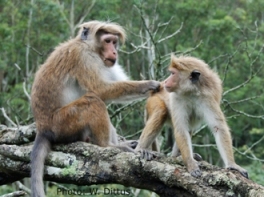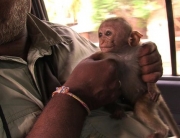 8 Jan 11. At the IFS Annual Review 2010, held in Kandy, Dr. Dittus presented recent research results from the Primate Biology Program.
8 Jan 11. At the IFS Annual Review 2010, held in Kandy, Dr. Dittus presented recent research results from the Primate Biology Program.
The talk focused on the genetic, demographic and behavioral relationships involved in the avoidance of inbreeding in primates. The data spanned some 35 years of field observation and involved the genetic typing of about 1500 toque macaques. Using 1113 genetically profiled pedigrees we noted that only about 1% of this wild population of macaques was truly inbred (at Coefficient of Inbreeding, F > 0.125). Most inbreeding was prevented by the dispersal of males from their natal group at puberty. In addition, however, where close kin had an opportunity to inbreed, matings were prevented between close maternal relatives (parent-offspring, siblings, aunts, nieces) but not among maternal cousins, or, albeit rare, paternal relations. Although macaques recognize one another as individuals, the avoidance in inbreeding involves as yet little understood mechanism by which monkeys distinguish between close and distant relatives. The results have broad relevance among mammals including man.






